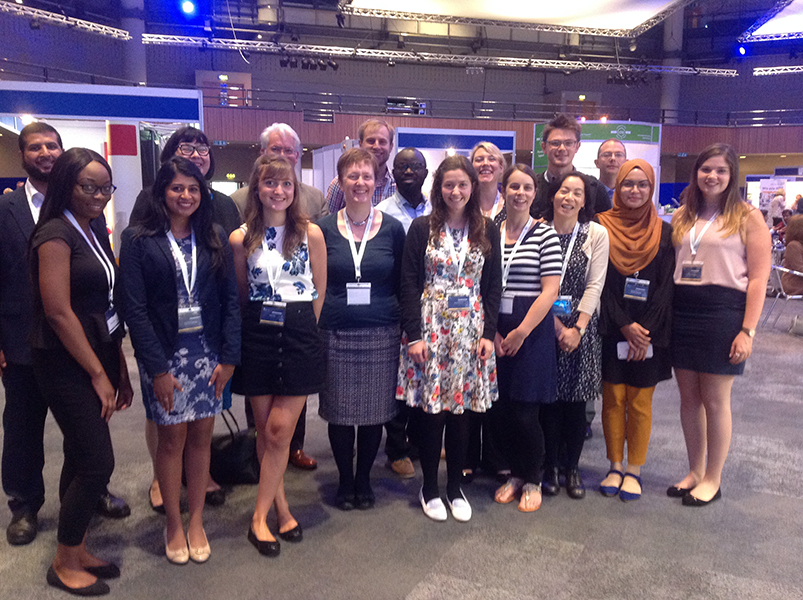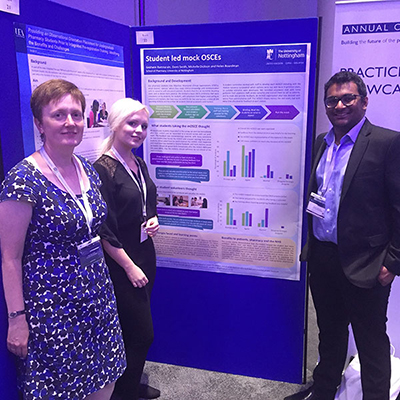September 26, 2016, by Editor
Royal Pharmaceutical Society Annual Conference 2016
This blog was written by Katie Porter, Robert Oakley, Priya Ravendren and Yewande Awoniyi who were funded by the School to attend the Royal Pharmaceutical Society (RPS) Annual Conference this year.
The 2016 Royal Pharmaceutical Society (RPS) Conference was held at the Birmingham International Convention Centre. The School of Pharmacy was represented by a group of students who were privileged to have their project abstracts published in the International Journal of Pharmacy Practice. This was a huge achievement for each of them and they were also given the opportunity to present their posters at this event. This event is held yearly and it’s an opportunity to broaden your horizons and learn about key changes and developments in pharmacy practice. The students who represented the University have given us an insight into what this event entails.
Poster Presentations
After our MPharm research project abstracts had been accepted by the RPS, our posters were displayed in the innovation showcase and poster galleries. We were also required to give presentations on our posters to large audiences from a variety of pharmacy backgrounds. These sessions also gave us the opportunity to learn about similar research happening across universities, hospitals and in primary care which we all found really interesting. There was the opportunity to learn a lot of new things and see how organisations across the country are tackling current pharmacy issues.
Awards Evening
The Awards night again was a great place to network and even meet future employers! The evening began with a drinks reception and the three-course dinner where you were seated with pharmacists from different backgrounds and experiences. The Awards that were won were not just for Pharmacists who have been working for many years, instead even students like us could be recognised! There were prizes for ‘RPS Student of the Year Award’ and ‘RPS Pre-registration Pharmacist of the Year Award’; it shows that even if you are new to your studies or the profession you can still make a difference. If you are attending the conference the the Awards dinner is a must! So enjoy your time and use every opportunity to network and to learn more about what our profession has the potential to do.
Networking
The Annual Conference provided a rich opportunity to network with representatives from a diverse range of pharmacy sectors and evolving care models. Notable figures included Dr Keith Ridge, the Chief Pharmaceutical Officer for England and Professor Ann Jacklin who was involved in writing the Lord Carter Review. Both figures are heavily involved in shaping national pharmacy policy and we enjoyed challenging their views and learning more about the political arena. There were also opportunities to network with other pharmacists from the English, Welsh and Scottish Pharmacy Boards. It was fantastic to speak with such influential pharmacists from the political arena and share our thoughts on providing future pharmacy services, which were well received. We were also fortunate enough to be able to speak with clinical comissioning group representatives (CCG), community, industrial, research and hospital pharmacists who all provided us with a great insight into their roles and careers. Notably, Dr Graham Stretch who won RPS Clinical Pharmacist of The Year Award for securing an innovative new contract for providing care to 900 care home residents in London, and Alistair Gray who won the RPS Leadership In Pharmacy Award for developing a digital interface for transfer of secondary to primary care. All attendees were very approachable and enabled us to gain a comprehensive insight into the evolving pharmacy landscape.
Talks
The speakers at the conference shared a broad range of upcoming and current developments in pharmacy. Presentations consisted of plenary lectures which addressed the entire conference congress and smaller, specific break-out streams consisting of several speakers with smaller audiences.
A rough break down can be seen below:
Plenary lectures:
Presidential addresses, research in pharmacy, transforming NHS services, education and a ministerial address.
Break out streams:
- Innovation: new medicines, better medicines, better use of medicines. An industry streak consisting of personalised medicines, biologicals and medicines legislation.
- Workforce Development and Education: Sessions focussed on how the pharmacy workforce could develop to meet new proposed models of care, quality systems and new medicines.
- Developing and Enabling Models of Care: By far the most popular sessions which outlined examples of how all pharmacy sectors had adapted to provide a different approach to patient care. There was a heavy emphasis on community pharmacy’s role in optimising care home residents’ medications and how support could be offered to urgent care services and hospital pharmacy to deliver a 7-day NHS.
- Enhancing Patient Care Through Research: Nottingham alumni Dr Boardman, Dr Boyd and Katie Porter presented some very interesting presentations in this stream which contributed nicely to the themes on developments in education, primary care and medicines optimisation.
“The future of pharmacy is looking bright! As pharmacy students, ensure that you use your professional responsibility, clinical competence and confidence to ensure the best outcomes for patients”
Details of projects
In the research section:
Priyanthine Ravendren (with UNMC) Health Seeking Behaviour of Undergraduate Students for Minor Ailments
Kathleen Porter (With Notts HC trust) Evaluation of Third Party Medication Errors reported in a UK Community and Mental Health Care Trust
Robert Oakley (With Centre of Evidence Based Dermatology) Views of patients and healthcare professionals on unwanted effects of leave-on emollients used to treat atopic eczema
Sy Bt Wan Abdul Wahab (NHS Project) Customer perceptions of trust in community pharmacists
Abigail Powell (with Nottingham West CCG) Adherence to guidelines in the use of antibiotics in the treatment of urinary tract infections in adults in a UK GP practice
Yewande Awoniyi (with Hospital Trust) Adherence to loading dose guidelines by healthcare professionals who prescribe warfarin in a hospital setting
In the innovation showcase:
Demi Smith and Geshwin Ramnarain student led mock OSCEs
Other students were also there in other capacities (self-funded and BPSA).



All, very well done, not just for presenting, but for making the very best of the opportunity to network and meet a wide range of pharmacists working in and across many sectors. As Dr Ridge said in his keynote, ‘the future belongs to you’, so all, make every effort to keep up to date with developments and opportunities – ‘be the best you can be.’
Great article. Thanks for sharing.